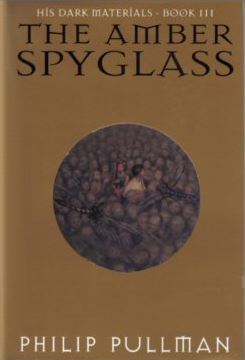Author Philip Pullman is a master of modern children's literature. His trilogy, His Dark Materials, is one of the most beloved fantasy series of the last twenty five years, although Pullman himself considers the books "stark realism" not fantasy. Writing for children, Pullman believes, enables him to engage his readers in ways he would otherwise be prohibited - he revels in intricate plots and characters. He has won the Carnegie Medal (1995), Guardian Prize (1996), and Astrid Lindgren Award (2005). And recently, HBO announced the air date for its upcoming series based on His Dark Materials. Fans of Pullman's stories don't have to wait long. The series will premiere on November 4 in the U.S. and November 3 in the UK.
A characteristic of Pullman's writing is its double appeal. His writing has classical literary origins in the likes of Milton, von Kleist, and Blake. His themes and direct influences come from the Bible and Homer, but his work is expertly crafted for children and is endowed with the kind of entertainment density that fills a Hollywood blockbuster. We can't wait for the HBO series for this very reason.
Pullman claimed that he wanted to be a writer ever since he found out that books have authors. One of his earliest explorations of storytelling came when he was a teacher during his twenties. He found that he had time to tell stories to his classes, and believed a teacher ought to have one ready for rainy Friday afternoons. He told stories about the deaths of gods and goddesses, about myths and legends, and happily realized that the story itself changed with each recitation. Through the years, over his different class periods, he estimates he must have told each story 36 times
As a teacher, Pullman not only exposed students to his tales, but adults as well. He plays for the end of the school year, and found himself writing simultaneously for adults and students. He didn’t appreciate the practice of throwing in sophisticated jokes for teachers and parents, he preferred to treat every audience member the same. With this practice, he began cultivating his talent for telling stories that transcended the separations of age; stories that everyone found interesting, and often for the same reasons.
Pullman had a special interest in his characters’ coming-of-age, the transformation from innocence to experience. The protagonist of His Dark Materials, Lyra Belacqua, is a twelve-year-old girl, and undergoes such a time. No one can claim that Pullman’s research isn’t thorough. He spent twelve years teaching girls of that age and found that they generally split into two major groups. One is the early sophisticates, the ones who know the lyrics to pop music and sometimes have boyfriends, while the others are girls who act younger, who still like to play with dolls and are interested in ponies. When speaking about what is so special about this transformative age, he drew great laughter when he said “Your life begins when you are born, but your life story begins at that moment when you realize you are in the wrong family."
According to Pullman, he has no interest in being a serious writer. He is happy telling good stories, ones that people will enjoy for years to come. One might predict that such a simple attitude would save Pullman from controversy, but this is not so. Many parents object to his work, especially on religious grounds. In his novels, Pullman portrays the Church and organized religion as oppressive. He said of his censors: “They’ll find a story that attacks such things as cruelty, oppression, intolerance, unkindness, narrow-mindedness, and celebrates love, kindness, open-mindedness, tolerance, curiosity, human intelligence. It’s very hard to disagree with those. But people will."
If he has offended anyone, he said that it is not out of affirmation of his own self-importance. Rather, he aims to challenge readers' prejudices, preconceptions, and comfortable assumptions. He believes no one has the right to go through life unoffended, and it’s unreasonable to hope that because something is offensive, it ought to be silenced. One’s feelings do not take priority over the pursuit of truth, he asserts. If, in writing the stories that need to be told, he offends someone, so be it.










